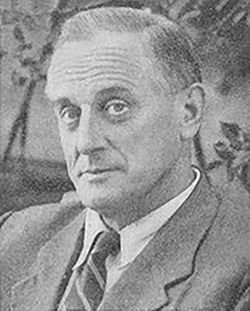1959
Our President in 1959/60 was:
Hesketh Pearson
He proposed the Toast to Sir Walter at our 52nd Annual Dinner on Friday 4th March 1960 in The North British Hotel
Download the [transcript] or read the [bulletin]
Summary of the Speech:
Hesketh Pearson's toast to “The Memory of Sir Walter Scott” is a vivid, humorous, and deeply admiring reflection on Scott’s character, literary achievement, and enduring humanity. Combining anecdotes, literary critique, and personal revelation, Pearson offers both an entertaining and reverent tribute.
Key Themes and Highlights:
1. Scottish Ancestry & Personal Connection:
- Pearson opens with a light-hearted account of tracing his Scottish ancestry after being named Club President.
- He discovers he is descended from Robert Barclay of Ury and Sir Ewen Cameron of Lochiel, whom Scott immortalised.
- Jokingly disclaims any claim to the Scottish throne despite a genealogical link to James I of Scotland.
2. Early Detestation, Later Admiration:
- Pearson confesses he detested Scott in youth due to uninspired schoolroom recitations.
- A turning point came when he read Scott’s Journal at age 40—prompting a transformation of opinion and leading to his biography of Scott.
- He declares it “the greatest diary ever written,” rich in wisdom, modesty, and character.
3. Search for Flaws:
- Finding Scott too virtuous, Pearson sought "good vices" to balance his biography and even appealed to Percy Stevenson and Dr. Corson for dirt—without success.
- The only faults he unearthed were minor:
- Harshness toward his brother Daniel, later repented.
- Rudeness to Lord Holland, later amended.
- He quips: “Otherwise a Life of him would not be a biography but a hagiography.”
4. Literary Genius and Modesty:
- Scott’s humility extended to his own work; he often undervalued his writing.
- Anecdotes:
- Mistook a song from The Pirate as someone else’s.
- Said The Monastery was written “with as much care as the others—that is, with no care at all.”
5. Anecdotes and Wit:
- Rich stories show Scott’s humour and patience:
- Rebuking guests who mocked a bore: “It requires no small talents to be a decided bore.”
- Witty repartee with his wife over Macnab’s supposed death.
- Called one rejected suitor’s sister a “grim grenadier.”
- Shared Bernard Shaw’s paradoxical opinion that Scott was a better writer than Shakespeare (used for rhetorical shock).
6. Endurance and Pain:
- Remarkably, Scott wrote A Legend of Montrose and The Bride of Lammermoor while in excruciating pain from gallstones and under heavy medication.
7. Response to Critics:
- Pearson condemns highbrow critics who mocked Scott’s popularity or accused him of “toadyism” (e.g. for keeping a glass George IV used).
- He recounts how Scott accidentally smashed the glass, undercutting the charge.
- Quotes Scott’s dry wit: “I have my quarters and emblazonments free of all stain but border theft and high treason, which I hope are gentlemanlike crimes.”
8. Royal Admiration:
- Both George IV and Queen Victoria greatly admired Scott.
- Victoria’s 1867 visit to Abbotsford is recalled as a touching expression of esteem.
Final Sentiment:
Pearson ends with a resonant tribute: “We at any rate will do honour to one whose greatness as an artist was matched by his benevolence and fortitude as a man.”
Notable and Quotable:
- “Start again, and if you don’t put a little more meaning into what you are saying, you’ll get a wicket where you least expect it.” (schoolmaster on Scott)
- “Life is too short for the indulgence of animosity.” – Scott
- “The blockheads talk of my being like Shakespeare—not fit to tie his brogues.” – Scott
Download the [transcript] or read the [bulletin]

Subsidiary Toasts
The toasts of "The Queen" and "The Royal Family" were duly honoured.
Thereafter Professor William S. Tindall, O.B.E., D.D., proposed the toast of "The Imperial Forces", to which Vice-Admiral R. H. Wright, C.B., D.S.C., The Flag Office, Scotland, replied.
"The City of Edinburgh" was proposed by Mr Vaughn R. De Long, American Consul-General, and replied to by Bailie A. D. Jameson, representing the Lord Provost of The City of Edinburgh.
The toast of “The Chairman” was proposed by Mrs Patricia Maxwell Scott.


